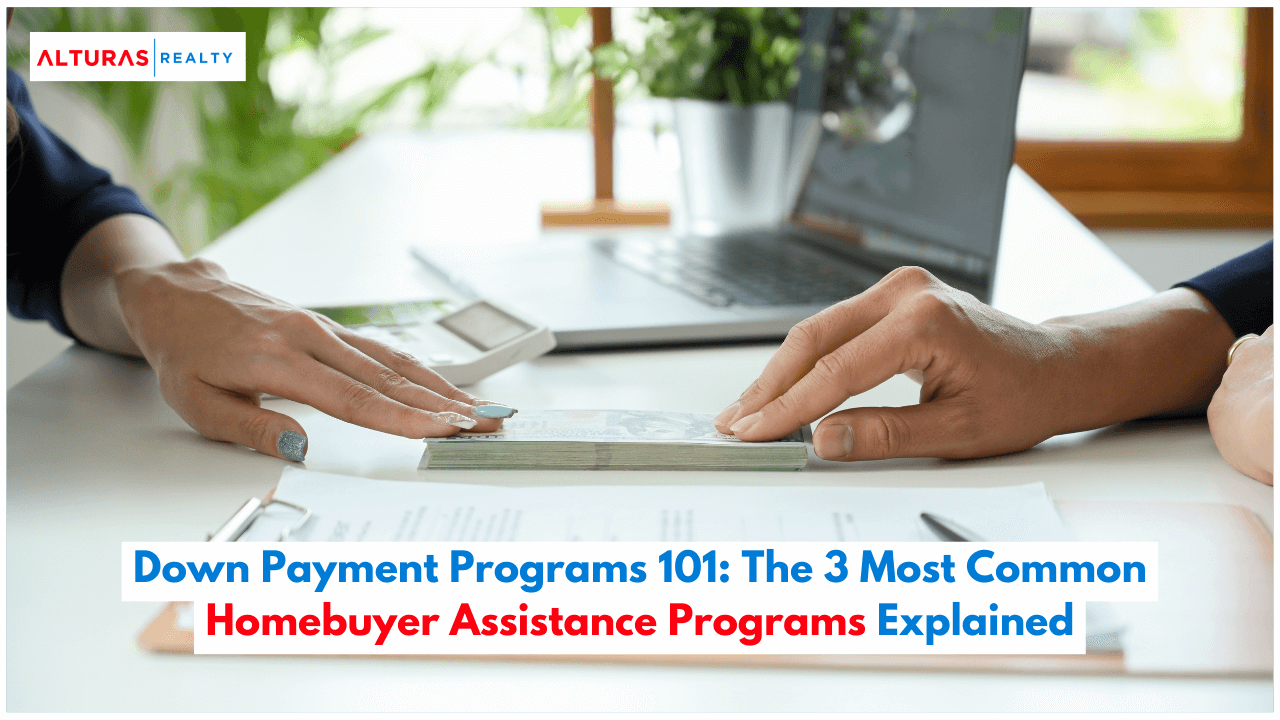
Down Payment Programs 101: The 3 Most Common Homebuyer Assistance Programs Explained
Looking to fulfill your aspiration of becoming a homeowner but concerned about the financial burden of a down payment? Fret not, as there exists a multitude of programs designed to assist homebuyers like yourself. These invaluable resources can transform your dream of homeownership into a tangible reality.
However, with the abundance of available options, determining the right program for your needs can be daunting. Therefore, we present an inclusive overview of the three most prevalent homebuyer assistance programs.
Delving into each program’s distinctive attributes and eligibility criteria, you can make an informed decision and leverage the advantages offered by homebuyer assistance programs, propelling you closer to acquiring the home of your dreams. So, let’s dig in…
Homebuyer Assistance Programs: A Quick Rundown

Homebuyer assistance programs encompass a range of offerings, including financial aid like loans, grants, tax benefits, and additional forms of support. These multifaceted initiatives aim to empower qualified homebuyers by assisting them with down payments, alleviating the burden of closing costs, and expediting the path to homeownership, allowing individuals to realize their dreams of owning a home sooner than anticipated.
Where Can You Find These Programs?
Homebuyer support initiatives receive financial backing from diverse origins, each accompanied by its distinct set of prerequisites and constraints. The responsibilities assumed by program facilitators and supervisors tend to differ. Still, they endorse eligible lenders who undergo specialized training on program directives and are authorized to initiate, streamline, and finalize designated initiatives.
Collaborating with an accredited lender enables you to pursue the possibility of securing down payment assistance, or you can reach out directly to the program-issuing organization for further information and application procedures.
Are You Able to Qualify These Programs?
To participate in homeownership programs, you and the property you intend to purchase must meet specific criteria. These programs are designed for individuals planning to live on the property, not for investment purposes. Eligibility requires a minimum investment, qualification for a first mortgage, and completion of homebuyer education.
Factors like the home’s price, income, and homeownership history determine eligibility. Certain professions and households with disabled members may have tailored programs. These initiatives aim to provide personalized support for achieving homeownership.
Are You a First-time Home Buyer?
In order to be recognized as a first-time homebuyer, it is crucial to meet a specific criterion: you should not have owned a home within the past three years. This means that if you were previously a homeowner but are presently renting, you may have the opportunity to be classified as a first-time homebuyer once again.
Notably, a significant 38 percent of the programs in our comprehensive database do not impose any specific requirements exclusively aimed at first-time homebuyers. This indicates that these programs are open to a broader range of individuals, providing flexibility and potential opportunities for first-time buyers and those with previous homeownership experience.
1. Down Payment Assistance Programs

The majority of available programs, precisely 74%, focus on assisting with down payments and closing costs. Down payment assistance (DPA) encompasses a wide range of initiatives provided by government agencies at federal, state, county, or local levels, as well as nonprofits and employers. These DPA programs can be classified into two primary forms:
DPA Grants Programs
These programs offer grants as generous gifts to homebuyers during the closing process. The grants are designed to cover some or all expenses associated with down payments or closing costs. Importantly, homebuyers are not obligated to repay these grants, and they do not impose any liens on the purchased property. There are no notes or deeds associated with these grants either.
Secondary Mortgage Options
A significant portion of down payment assistance programs is structured as second mortgages, commonly referred to as subordinate liens. These secondary mortgages come with various repayment provisions:
Repayable DPA Programs:
At closing, homebuyers can access down payment funds through 0%-interest second loans. While some loans may accrue interest, others operate as amortizing loans. Repayment terms for these programs range from 5 to 30 years, typically starting immediately or after a predetermined period. Such programs benefit buyers planning to reside in their homes for an extended period, as they can take advantage of the property’s appreciation in value.
Deferred or Silent Second Programs:
In these programs, repayment of the down payment assistance is postponed until the borrower decides to sell, refinance, rent, or move out of the home. This setup is particularly advantageous for buyers who intend to live in the property for several years, allowing them to leverage the home’s appreciation.
Forgivable Second Mortgage Programs:
Under this category, a portion or the entire amount of the down payment assistance is forgiven over time. The forgiveness process varies, but it is common for a specific percentage of the loan to be forgiven each year for a predetermined number of years. However, if the homebuyer fails to meet the program’s conditions, such as moving out of the home, the loan must be repaid, potentially with interest.
2. Low-cost First Mortgages

State-level housing finance agencies offer a range of affordable home loan options as part of their comprehensive down payment assistance programs. These loans, supported by state housing finance agencies, come with interest rate subsidies for lower rates than the market average. This means you can save on overall purchasing costs and enjoy lower monthly payments. These programs often include benefits like reduced closing costs, waived fees, and exemptions from mortgage insurance.
Additionally, two mortgage programs are overseen by the United States Department of Agriculture (USDA), namely: Rural Direct Loans and Rural Guaranteed Loans. These programs cater to individuals or households with moderate to low incomes, promoting homeownership among rural residents. Among the uses of the funds are property acquisition, construction, repairs, renovations, and relocation.
3. The MCC Programs
MCC, also known as the Mortgage Credit Certificates program, serves as an annual federal income tax credit specifically crafted to provide valuable support to first-time homebuyers, helping to alleviate the financial burden of mortgage interest payments on a new loan. Its primary objective is to enhance their chances of qualifying for a mortgage.
Unlike a mere tax deduction, the MCC operates as a tax credit, directly reducing your annual tax liability and putting more money back in your pocket. Depending on the state or local government issuing the mortgage credit, the actual amount available can vary, but it is generally capped at $2,000 per year by the Internal Revenue Service.
Furthermore, MCCs often complement other down payment programs, allowing homebuyers to harness the benefits of multiple assistance programs simultaneously, enabling them to leverage various resources in their journey toward homeownership.
Final Words
You can explore local programs that align with your circumstances by thoroughly searching your area. Additionally, use your state’s Housing Finance Agency to access a comprehensive list of available programs. Take the time to examine the agency’s roster of mortgage lenders participating in these programs and consider interviewing a select few to identify the ideal match for your needs.
